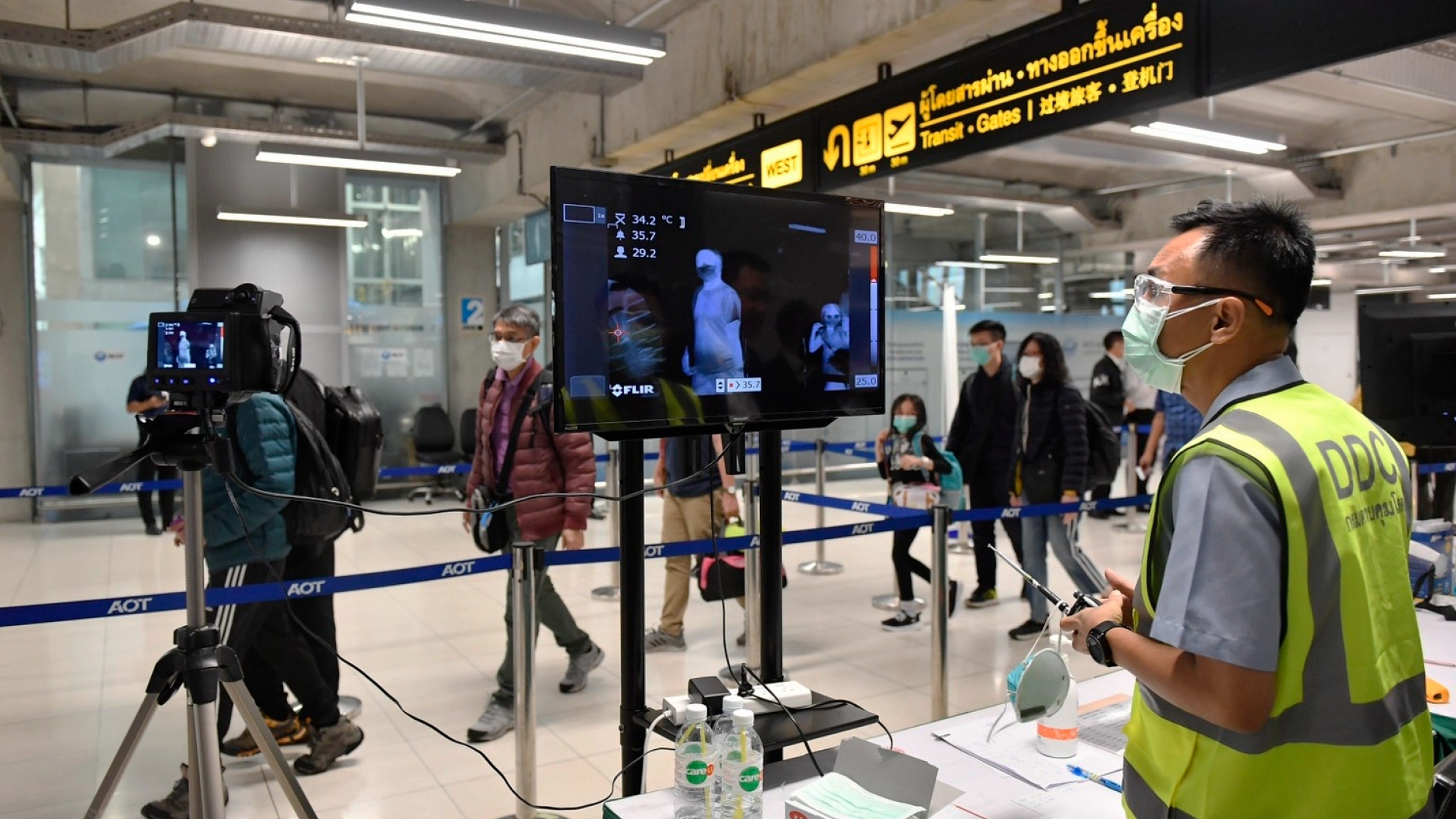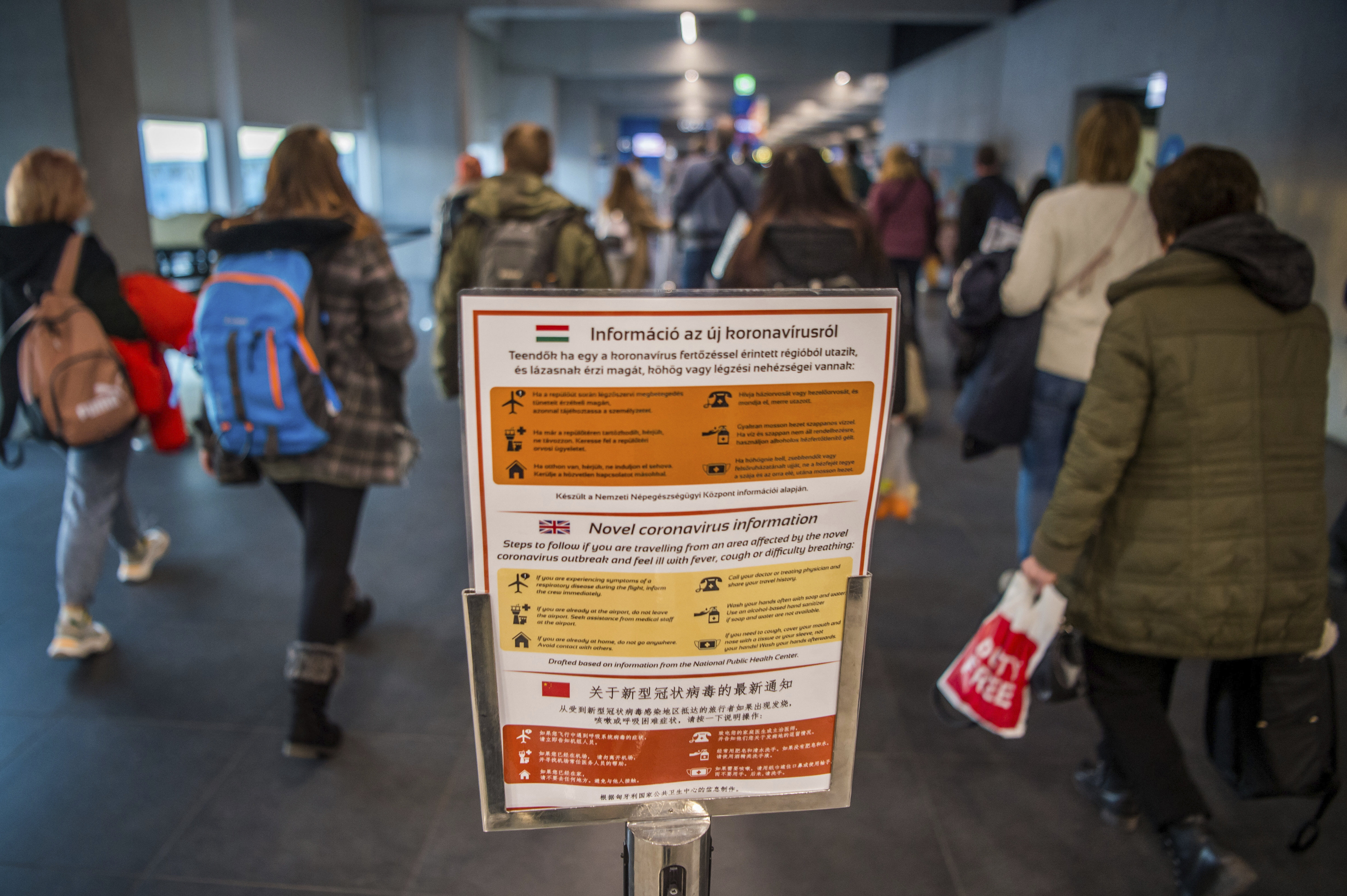
A health worker watches thermal images to detect passengers who may be infected with coronavirus at Suvarnabhumi International airport in Bangkok, Thailand, January 29, 2020. /AP Photo
A health worker watches thermal images to detect passengers who may be infected with coronavirus at Suvarnabhumi International airport in Bangkok, Thailand, January 29, 2020. /AP Photo
Travel warnings from several countries this week advising their citizens to leave China, alongside conflicting information from other embassies in the wake of the coronavirus outbreak, have created confusion among expats wondering what their best course of action is.
On Tuesday, Foreign Secretary Dominic Raab announced the UK was advising British citizens "to leave the country if they can, to minimize their risk of exposure to the virus."
Germany's foreign ministry, in an emailed newsletter, recommended that German citizens currently in China "consider temporarily leaving."
Portuguese nationals in Beijing said they received a phone call from their embassy on Monday saying the same thing, although no formal travel advisory has been issued by the Portuguese foreign ministry.
A travel advisory posted on the New Zealand ministry of foreign affairs and trade's website on Wednesday meanwhile noted: "We advise New Zealanders currently in China to depart at the earliest opportunity."
And France put out a warning recommending that "French nationals, especially families, for whom it is not essential to remain in China, momentarily leave the country."
This came days after the U.S., Australia, Russia and several other countries evacuated their people from Wuhan, the city in central China's Hubei Province that is at the epicenter of the outbreak and has been under quarantine for two weeks to avoid a further spread of the coronavirus.
It also followed the announcement by dozens of major airlines – including Qatar Airways, Lufthansa, Air France, Qantas and Delta Airlines – that they were suspending flights to China for the weeks to come.

A worker wearing a protective suit checks the luggage of a passenger from Wuhan, China, after her evacuation flight landed in Marseilles, France, February 2, 2020. /AP Photo
A worker wearing a protective suit checks the luggage of a passenger from Wuhan, China, after her evacuation flight landed in Marseilles, France, February 2, 2020. /AP Photo
'How did it escalate?'
But the suddenness and vague wording of the advisories left more than one foreigner confused as to what they were actually being asked to do.
Cristina Gatti, who has both British and Italian nationality and moved to Shanghai last year, said she has remained calm in the wake of the outbreak, which so far has killed 564 people, with over 28,000 confirmed cases worldwide.
But reading in the news on Tuesday that the Foreign and Commonwealth Office (FCO) was advising all British nationals to leave was a shock.
"I went to see the actual FCO statement and it said 'leave if you can' but that's the only sentence: 'if you can'," she told CGTN.
"How did it escalate from 'avoid anyone who sneezes' to 'leave now!'?" she wondered. "I am just going through a little crisis because information is not clear, nor consistent and I don't know what to do."
There have been 257 confirmed cases of coronavirus in Shanghai but so far just one death. Gatti said she and her husband have until now felt safe: they have stayed mostly at home as recommended, except to go to the supermarket or for a walk.
"Now the FCO is telling me to get on a plane for 12 hours and put myself at risk. Why?"

People pass a notice with information about coronavirus at Budapest Liszt Ferenc International Airport in Budapest, Hungary, February 5, 2020. /AP Photo
People pass a notice with information about coronavirus at Budapest Liszt Ferenc International Airport in Budapest, Hungary, February 5, 2020. /AP Photo
So many unknowns
Embassies have been in touch with their nationals spread all over China throughout the health emergency, sending updates via email or WeChat. And for the most part, these communications and advisories warning foreigners to avoid unnecessary travel to China have been well received.
"But what unsettled me was the recommendation to leave China," said Birgit, a German mother-of-two who has been in Beijing with her family for about a year.
The Chinese capital, over 1,000 kilometers from Wuhan, has had 274 confirmed coronavirus cases and one death.
For Berwick Settle from New Zealand, who has lived in Beijing for seven years, the raft of advisories "is very typical of governments that they always take the safest option because they don't want to be caught out later on."
Although calm, he said he was "quietly nervous" about the current situation. "There's just so much unknowns. No one knows, none of the governments know, the WHO (World Health Organization), etc… no one knows what's going to happen with this."
Mixed messages
Exacerbating the confusion are mixed messages being sent from several capitals. A day after France put out its advisory, the foreign ministry told a press briefing on Wednesday that "it was never intended to advise all our citizens to leave China."
Portugal's ambassador to China, José Augusto Duarte, meanwhile told Macao broadcaster TDM on Sunday that no recommendation was being given to either stay or leave the country. "We don't want to create panic, nor do we want to tell everybody to stay. It's an individual decision that should be made based on the information that is public and one's individual situation."

Notices relating to coronavirus on the websites of the French and New Zealand foreign ministries, February 6, 2020. /CGTN screenshots
Notices relating to coronavirus on the websites of the French and New Zealand foreign ministries, February 6, 2020. /CGTN screenshots
Even among EU partners, there seems to be a lack of agreement on the way forward. Gatti noted that while the FCO was putting out alerts, Italy's foreign ministry didn't even mention coronavirus on its main page.
Spain has made no recommendation to its nationals to leave, nor has Austria, although the embassy in Beijing, in an email on Wednesday, gave details on the next direct flights to Vienna, "for those considering temporarily or prematurely leaving China."
Health experts say the outbreak has yet to peak, meaning it could still be weeks, or even months, until it is over.
"If we go home, how long are we going for?" asked Gatti. While she may be able to work remotely, she's not sure about her husband. "What is going to happen with his job? Is he allowed to leave?"
'It's our home'
For now, those still in China are not rushing to book their flights out.
"We're not scared. At the moment, we're still quite relaxed. Since Monday, the children have been studying again, via online-learning at home, so they're busy all day," said Birgit.
"But I don't know if in one or two weeks' time we won't get cabin fever and want to fly out, assuming that is still an option."
Gatti said she and her husband have decided to "give it a couple of days" before making up their mind. "I don't think today is the day to take the decision to leave," she noted.
Settle admitted he discussed leaving with his girlfriend but for now "we're happy to stay here," adding half-seriously that he "cannot be bothered either to work out what flights are still available out of China."
"It's our home, it's our life," he said. "If it gets any worse, maybe we will leave China, but at this stage no plans to leave."